- Home
- Arthur Miller
Timebends Page 2
Timebends Read online
Page 2
He somehow managed – despite a steady underlying seriousness which few writers have matched – to step round the pit of self-importance and to keep his membership in the ordinary human race in the front of his mind and his writing.
I had an e-mail shortly before Arthur’s death from a mutual friend in New York who had just seen him in hospital, unable to talk after his recent treatment. It read: “When I saw Arthur Sunday I told him that I had had dinner with you last week in London and he gave a loving smile in return.” I e-mailed my friend back that I would call Arthur at the weekend when he’d been settled back in Connecticut. I heard of his death that Friday afternoon. On returning home I saw a note to myself on my desk: “Ring Arthur.”
Richard Eyre
May 2005
Introduction
Some ten years ago—when I was merely seventy—a certain number of biographers’ proposals arrived, causing contemplation of mortality and, almost as disheartening, the prospect of having to talk to someone endlessly about events in my past. I saw that there would be no stopping these people, especially once their attentions began tickling my vanity. But there was a way of at least delaying them until I was gone, and that was to launch a preemptive strike. Thus my autobiography was born.
I thought at first that some two hundred or so pages would be enough to cover what might be worth reporting of my existence, but I soon began to enjoy chatting to myself and the thing just went on growing, and gradually I became aware of at least one important motive behind it: the desire to share the past with younger people. As has been noted innumerable times, the past for Americans is not prologue to their own lives, but something disposable, like old houses in the middle of town where a new supermarket is to stand, or old people, or Christmas wrappings. (I suspect the past by now is an irrelevant bore to the young in several other countries too, especially where its hold is still strong.) Indeed, my own father, whom I visited one afternoon in the old persons’ hotel where he lived for a while in his eighties following my mother’s death, replied to my question as to how he was liking the place, “Too many old people here.” I felt the same way, in fact, so it was easy to share the absurdity of that remark. Old as he was, he much preferred being surrounded by the young, with their plans for the future, their optimistic hopes, their restless irritation with constraints, and their good-looking girls.
In England, Europe, and Latin America, this book has been one of my best-reviewed and widely noticed works, while in my own country it was as often as not passed over when it was not aggressively dismissed by a few critics, even hated by two or three. I can think of two reasons. One is a protracted animus in some American commentators for anyone who was attracted by Marxism and what once seemed the promise of a more benign Russian socialist civilization, and more important, failed to lie on his back afterwards wailing his guilty remorse for his error. The second is the absence in this book of a forthright investigation of Marilyn Monroe’s sexuality. Without a complete roster of his or her sexual proclivities, it seems, nothing worth knowing can be said about a human being, and the kiss without the tell simply doesn’t register as interesting, let alone honest. I can’t think of how to apologize for either failing, but much as I would have liked the book to have met anyone’s legitimate expectations, you can’t have everything.
This book is not an attempt at history, of course, if only because I strove to hew to my own awareness in what were the crucial decades of the century, and to keep to a minimum the after-the-fact wisdom that can only cloud the picture of my evolution, and presumably that of others.
Much is usually made of the impact of the Depression on my generation, and in fact it was the single major preoccupation of the people I knew. I am sure it was also at the center of the worries of the whole country over the decade between the crash of 1929 and the start-up of business and industry as we approached the forties and the burgeoning Second World War. But for the radical youth especially, and the intellectuals as a whole, there was another shadow over our heads as dark and as menacing, and that was the Spanish Civil War, which lasted almost four years, until the Fascist victory in 1939.
If I cannot attest to what was going on in Hitler’s mind, I do recall the atmosphere I lived in at the time; the refusal of England, France, and the United States even to sell arms to the legitimate Spanish Republican government so it could fight off a rebellion of its army seemed to prove that the Western governments were not going to resist Hitler’s and Mussolini’s expansion of Fascist control over all Europe. In the face of Germany’s raging anti-Semitism and its assaults on culture and human rights, the nonintervention policy under which Western governments agreed to isolate Republican Spain—even as Hitler was sending in German air force units and Mussolini was arming Franco—made the remark of Anne Morrow Lindbergh that “Fascism is the wave of the future” ring with frightening plausibility. It has not been a good century for prognostication, but the prediction of the left—among others—that Spain was a rehearsal for the new European war was on the mark. Indeed, shortly after Franco had won Madrid, Franklin Roosevelt whispered into the ear of Harold Ickes, his Secretary of the Interior, who had been pleading with him in vain to aid the Republic, “Spain was the greatest mistake I ever made.” This according to Ickes’s autobiography.
The future cannot be known, of course, but our current feeling of impotence before the future was not quite the case before World War II. If the good life, and for some people reason itself, had disintegrated with the stock market in 1929, the idea of progress, I believe, marched right on. (The 1938 World’s Fair motto, “A Century of Progress,” certainly did not seem boastful to most Americans.) For radical or conservative the question was not whether America would continue to increase its wealth or whether the unemployed would ever work again, but when and by what means. Europe might be a rusting ship tied up at a pier, its voyaging days over, but bad as things were, we had not yet made port, and were still on our way to somewhere wonderful.
It is different now, of course; despair has become a veritable obligatory style, the American future lost in its past. The armies of the right call up a “Christian” outrage at a government that they see as elitist, secular, and liberal, and the left struggles with a confused distrust of government that seems destined to corruption by big business; these two mutually hostile camps leave any conceivable coexistence within an organized society in question. One did not imagine that so much of social existence and even lawfulness depended so heavily on mere good faith. Not since the sectarian fights within the radical left wing movements of the thirties has such violent hatred and paranoid suspicion ruled mainstream political intercourse, this time presided over by right wing radicals calling themselves conservatives, and liberals trying to sound as conservative as possible.
A doctor’s ability is judged on his ability to forecast the course of disease, the lawyer’s wisdom on his foresight as he weighs probabilities; but what gauge can we rightly apply to politicians and political savants? Amnesia would seem the best one available.
To be swayed by any of the current dogmas, one needs to forget that neither right, left, or middle, despite claims to the key to wisdom, had been able to predict with very few exceptions, the single most important event of the past half century at least, the crash and dissolution of the Soviet Union, no doubt. Politically, this is a comet from outer space smashing into the earth, but its implications are packed in the dry ice of purposeful inattention by all sides. Nobody seems to have been embarrassed by the implications of this catastophic failure. All our political science departments, our big business pundits, our journalists and editors should have been hung out to dry. Instead, there is an oblong nothingness greeting this evidence, which would seem to indicate that our understanding of the political life of our societies is about where it was under Charlemagne. What should have overtaken us is the realization that what we have called insight and wisdom is another disguise for unacknowledged ideology, a state of mind in which conviction comes first
and the facts last, if they come at all. As a forger of ideologies, the intellect in the last years of the century gets an A +, but as an observer of paradoxical reality it has been disgraced as never before in history—because it had never before presumed so much authority. All that remains is to admit to hubris, and perhaps in uncustomary humility we may then begin to dissipate our current sense of being condemned to wandering around in circles in a north Atlantic fog. But there is little danger of that happening.
On the personal level, if I were to start again—(perish the thought!)—I have the feeling I could write another, quite different, autobiography covering the same years as this one. For I had to leave out a lot for space reasons, and to keep some order in the proceedings.
I would have wanted to dwell more on unimportant matters that are not, however, insignificant: like my adolescent lust for sports, especially playing football on the vacant lot on Avenue M and Gravesend Avenue in Brooklyn in the early thirties when the crisp fall air helped drive us headlong into each other’s scary elbows and hard-pumping knees, without helmets or shoulder guards on a “field”—an empty lot bordered by sidewalks—littered with the shards of bottles tossed there by passing drunks. (Or the touch football games in the streets with the tall and skinny Epstein twins, my seniors by seven or eight years, a couple of oddball jokesters who I seem to remember did not graduate from high school, in a hurry to get to Hollywood, where they would one day write the penultimate script for Casablanca.) And the dramas of the ice-skating rink on Ocean Parkway, where you had to pay a grim, hard-earned quarter to get in to show off to girls, and hang out till closing time to get your money’s worth, half starved though you were by then. Books—a few—certainly did matter; obsessed with sports, I was also trying to puzzle out Gertrude Stein’s “A Rose Is a Rose,” handed me by a two-hundred-pound Colgate University tackle desperately trying to write poetry. But no doubt the most important thing in the world to boys were games and arguing about them.
The mind could be mesmerized by a Hemingway paragraph, but beside it hung the gorgeous memory of a long pass miraculously caught for a touchdown. To have stood up to Whitey, our fastball pitcher, despite one’s terror of being hit in the head by that rock-hard ball, did something to one’s confidence; and to have failed to make the long catch or to keep both eyes open as Whitey’s ball slammed past your face—the resulting conflicts were ultimately moral ones and surely helped mold one’s self-esteem or lack of it. Still, it is hard not to blush recalling the screaming arguments about the relative talents of a Yankee catcher or a Giants left fielder, a Red Grange or a Gehrig or Musial—these fruitless clashes, nevertheless offered a handhold on a spinning universe like nothing else, as I am sure they still do.
I imagine that what lies behind all this is the young man’s search for an identity. For some unknowable but imperious reason I thought of myself as second baseman. Not first, not third, not pitcher or catcher or outfielder, but second base. To contemplate this kind of absolute compulsion and to confess its inscrutable brainlessness can be an illuminating exercise. To become aware that one’s identity once depended upon loyalty to an abstraction and a conviction with little or no real content can open the mind to precisely the kind of thing in human affairs that causes more bloodshed than anything else.
I would have liked to have talked more about the Bible, which has been another unsolved mystery for me. I frankly don’t know what to make of God, or rather a god who would be interested, for example, in my little life. I believe the closest I ever came to actually visualizing a god was at the age of seven or eight when, helped by an aged Hebrew teacher, I puzzled through the Hebrew to learn that God created everything, including something called “the firmament.” This wasn’t quite the same as the earth, according to my white-bearded teacher. Then what as it? “It’s the whole thing,” he explained impatiently, going on to make clear that the earth was flat and the sky a solid blue vault, something you could prove by riding down the street on a bicycle. With this sensible architecture I could easily visualize an old man seated on top of the vault watching what was going on below. It was rather like a theater, come to think of it, and had a certain plausibility that a round earth has never gained in my mind, primarily, I suppose, because with the thing spinning around it left no place for God to sit down with any dignity.
I don’t recall ever thinking God loved or didn’t love me; having definitely created the world, he seemed to have disappeared into the synagogue, where he dealt mainly with old men about serious matters and ruled over weddings and the dead. When much later I learned that George Washington, Jefferson, and other founders were deists, who saw the world as a clock that God had wound once and then gracefully retired from, it struck a chord.
However, there have been moments when rationalism collapses and I am at the mercy of what some would call superstition and others insight. It is impossible, for me anyway, to understand the durability of the Jews without stepping into the circle of mysticism, a dangerous area where everything is possible and nothing, therefore, exists. Where are the Canaanites, the Moabites, the Philistines, the other great clans and tribes contemporaneous with the biblical Jews? Why did they not enter Western culture as the Jews did?
I feel sure nobody knows the answer to this, so I look within myself for one. I may have forgotten the little Hebrew I knew as a child, I never go to synagogue, and even find it troublesome to accurately remember which high holiday is which and what they signify, but something in me insists that there must continue to be Jews in the world or it will somehow end. There must also be at least one righteous man or the whole human city will go up in smoke, one whistle-blower, so to speak, or our conventional lies will sink everything, and I think I believe this. I recognize that like every other ethnic group Jews feel their own sufferings more than they do those of others, and have more pride in their own victories than in others’ victories, and I wish everybody could feel others’ pain as much as their own, but despite this high-mindedness I know I am more deeply hurt by a bomb explosion in Tel Aviv than perhaps another city elsewhere, and take just a little more pride in a Jewish Einstein than if he were of another persuasion. This identification has nothing to do with virtue—Jews are average in that respect, neither better nor worse. In fact, I have to face that it has nothing to do with anything, it simply is.
I am not the only writer, Jew or Gentile, who does not want his plays or novels to end in utter despair, even when objective events seem to demand precisely that conclusion—a Holocaust story, for example. But my resistance to despair seems to have something Jewish about it; some vagrant cell floating through my blood seems to demand that however remote and unlikely ever to be found, a ray of light has to remain after darkness has closed in, a glow of redemption must appear up there at the rim of the pit or the tale is something less than true.
Job is the only play in the Bible, and its most contemporary chapter. If it were ever taken seriously, half the church-going in the United States would grind to a stop. Job assures you that if after a lifetime of decent acts and goodwill toward others you lose everything you possess for absolutely no discernible reason,’you have no cause to complain. Job says you’ve got to believe, not only without reward in this life but with the most severe punishment. Job is the perfect message for the concentration camps, it is purest God-contemplation, love without reciprocation. It is religion without magic, without its open or implicit attempts to bribe God. Job is a church-closer. But would the world be better off without Job, that thinnest possible thread to the stars?
I might have written more about sex but for the feeling that it is a subject about which nothing new can conceivably be said—or even thought—even as it is the inexhaustible source of more income than any other single idea. In Brooklyn, one did not normally connect sex with love; if anything, they were opposites. You loved your mother, your sister, your aunt, but sex with them? Never. As for women, they did not think about sex because they were fully occupied with dressing up, cooking, m
aking ends meet, and encouraging their husbands. In this respect we were in a condition approximating Mark Twain’s Missouri frontier characters, American exemplars, whom he described doing a hundred different kinds of things except, as adults, falling in love.
I also neglected to plumb the depths of my early fascination with entertainers, singers, actors, and their careers. I was one of the more naive audiences for the pop culture of the twenties, thirties and forties, but I also recall being critical; when they first appeared I was badly split between Russ Columbo and Bing Crosby. Frank Sinatra at first was merely for girls, by all accounts an enviable, singing sex machine who took me a while to appreciate—he sounded gooey in the beginning. I somehow could admire but not really enjoy Fred Allen while falling in love with the Marx Brothers and most but not all of Jack Benny’s sketches and Amos ‘n’ Andy. (Amazing, is it not, how these people have lasted.) No audience is more critical than the pop audience; unlike the more cultivated and hip they don’t go on listening because they’re “supposed to,” past the point when they are being reached. When it no longer works for them they turn it off.
I have trouble with contemporary pop, which seems so unbearably repetitious and falsely naive. How performers who do commercials continue to have singing careers is baffling. When a man or a woman wails in precisely the same way for a lost love and a brand of shampoo it is hard not to suspect a certain cynicism, which is bound to spoil the effect when he or she turns to serious artistic efforts. I can’t recall Crosby, Ella Fitzgerald, Hoagy Carmichael, or any of even the lesser ones selling, but maybe it was just for the lack of opportunity. It seems to these old ears that there is an awful lot of automatic thumping and metronomic drum-bumping going on now, and stamped-out Broadway plainsong whose every note and lyric seem aimed rather too obviously at the bank. It is possible that memory is gilded by my youthful emotional investment in the music and lyrics of Cole Porter, and Sammy Cahn, Rodgers and Hart and the rest, and the playing of Benny Goodman, Fats Waller, and their cohorts. Those people were doing a sort of intimate private sex as opposed to the current kind, which is all public, like stuff coming out of a gum machine. But before the mystery of the tastes of the young, the old ought to shut up—now and always.

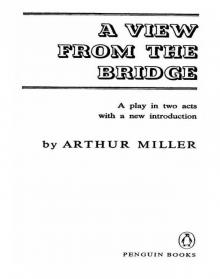 A View From the Bridge: A Play in Two Acts
A View From the Bridge: A Play in Two Acts Broken Glass
Broken Glass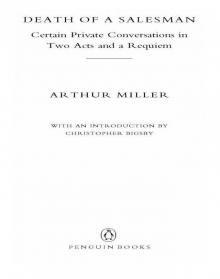 Death of a Salesman
Death of a Salesman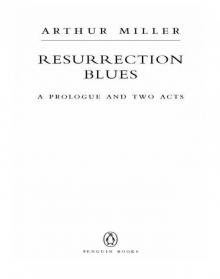 Resurrection Blues
Resurrection Blues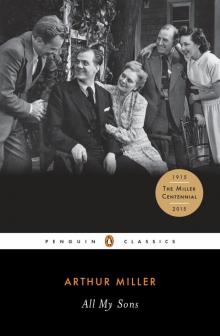 All My Sons
All My Sons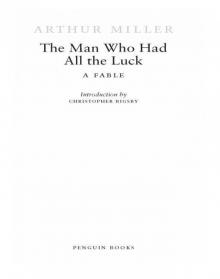 The Man Who Had All the Luck
The Man Who Had All the Luck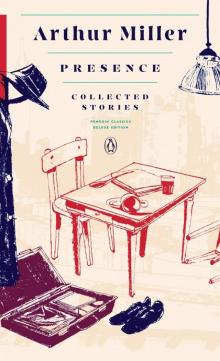 Presence: Stories
Presence: Stories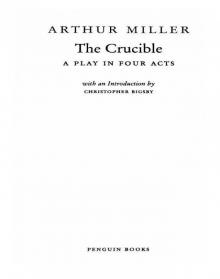 The Crucible
The Crucible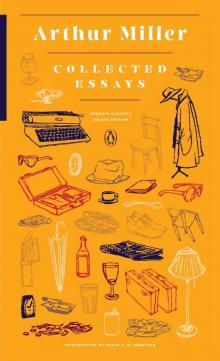 Collected Essays
Collected Essays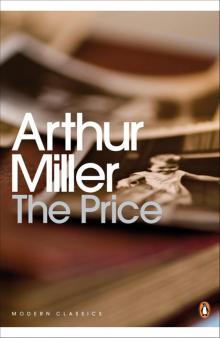 The Price
The Price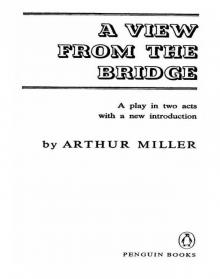 A View from the Bridge
A View from the Bridge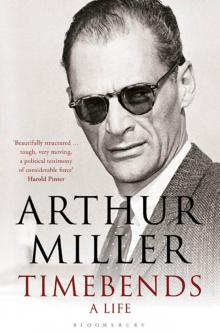 Timebends
Timebends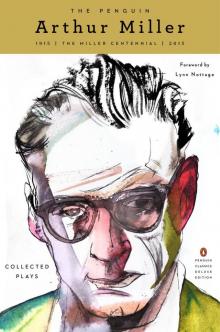 The Penguin Arthur Miller
The Penguin Arthur Miller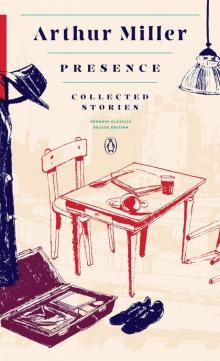 Presence
Presence